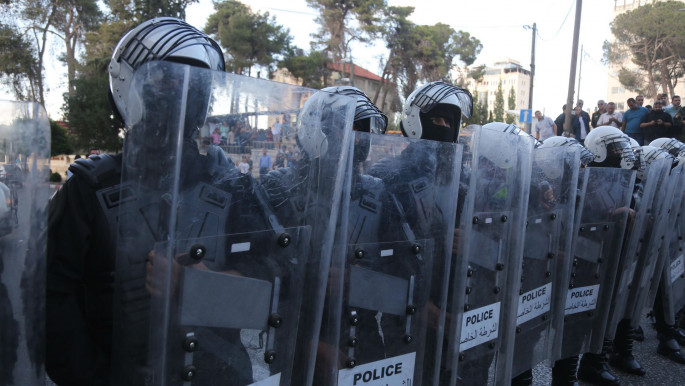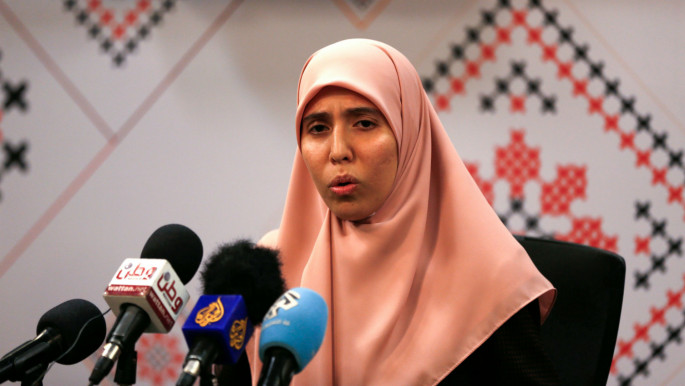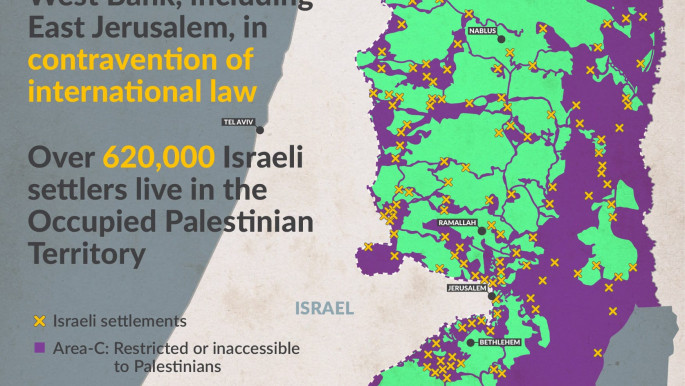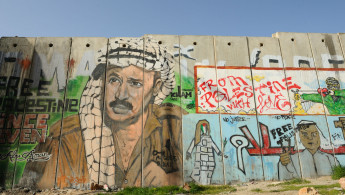Tortured by the Palestinian Authority: One woman's fight for justice
Over a year later, Jbara, 32, is still fighting for justice, her arrest merely the beginning of an ongoing battle against the opaque, and often arbitrary, legal system of the Palestinian Authority, where torture is a commonplace practice by security forces and accountability is lacking.
"It was 35 guys with weapons, like an army," Jbara, 32, told The New Arab of her arrest. "I was very nervous."
The men, members of the Palestinian Authority [PA] security forces, demanded that Jbara accompany them to the Intelligence Service headquarters near Ramallah. They did not say why they were taking her.
Overwhelmed by the trauma, Jbara, a US citizen born in Panama, had a seizure and passed out.
She awoke in a hospital bed, from where armed security officials dragged her barefoot into a minivan and drove her to a PA detention and interrogation centre in Jericho, which rights groups say is notorious for torture and abuse, largely of political activists.
 |
The Fatah-led Palestinian Authority, as well as Hamas authorities in Gaza, routinely arrest and torture civilians to crush dissent |  |
"Welcome to the Jericho slaughter house," she was told upon her arrival.
Blindfolded and handcuffed, over the course of three days she was beaten on her chest and back, slapped, shaken and slammed against a wall, and threatened with sexual violence.
 |
|
| Read also: Abuse and torture rife at Palestinian jails |
Rights groups say her case is the first time a woman has been detained and mistreated at the notorious Jericho security facility.
She was also deprived of sleep and prevented from going to the toilet, while one male interrogator threw water in her face when she asked for a drink.
"He insulted me all the time, used very dirty and violent sexual language, threatened to bring a doctor to look into my virginity and say that I was a whore... He also threatened to hurt my family and to take my kids away from me," she said.
Denied access to a lawyer and her family, she was forced to sign a confession which she wasn't allowed to read.
"They said 'your file is ready, it's done'," she told The New Arab.
"Whether you talk or don't talk, we have a file," her interrogators said.
'Kafkaesque'
The charges presented against her were paradoxical. She was accused of both "gathering and receiving illegal money", a claim used by the PA that normally refers to financially supporting Hamas, and "communicating and/or collaborating with the enemy", a charge referring to Israel.
Read also: Is Palestine's national election possible?
Jbara denies both claims. Hailing from Turmus Ayya, a wealthy town near Ramallah where many hold US citizenship, she has supported Islamic charities advocating for Palestinian prisoners in Israel, and reportedly provided money for impoverished families in Gaza.
With no way out, she began a hunger strike that lasted 26 days to protest her detention and torture.
After being admitted to hospital, where she was kept shackled to her bed, she was finally released in January 2019 and has ever since then been subject to the original charges, despite the fact that the prosecution is still gathering evidence against her.
 |
Suha Jbara's case is one of endless examples of arbitrary detention and torture by Palestinian Authority security forces |  |
Last month she appeared in court in the West Bank for the eleventh time. As with previous court appearances the hearing was postponed, with another scheduled next week.
"Fundamentally, international justice says you know the details of the case before the trial starts," Rhys Davies, a British barrister who is acting as international consul for Jbarra, told The New Arab.
Read also: Palestinian Authority blocks dozens of websites in media crackdown
The Palestinian Authority often releases detainees without dropping charges against them in order to have a pretext for future arrests, Human Rights Watch says.
 |
|
| Suha Jbara speaks to reporters in January 2019 after being released from two months of detention [AFP] |
Broad, or dubiously worded, charges used against peaceful activists deemed critical of the PA serve to both justify making arrests, and pressure suspects to stop their activities, HRW notes.
As a result, Davies has made submissions to the UN Working Group on Arbitrary Detention and the Special Rapporteur on Torture against the PA on behalf of Jbara.
"We want the UN to intervene and safeguard her rights and freedoms, and hope the PA will stop treating her in the way that they have," Davies says. "It is a Kafkaesque scenario."
'Guilty until proven innocent'
Suha Jbara's case is one of endless examples of arbitrary detention and torture by Palestinian Authority security forces.
"It is a continual pattern," Saleh Higazi, Amnesty International's Middle East Deputy Director, told The New Arab.
The PA's legal system operates on a "guilty until proven innocent basis," he says, with charges often relying on confessions rather than evidence.
As a result, torture is incentivised as an efficient tool to conclude investigations.
"Torture is rife within [Palestinian] law enforcement," he says. "In the case of Suha it started the moment she was taken off her hospital bed and into the detention centre".
 |
The court does what the security forces want. They are not going to be fair with me -Suha Jbara |
 |
"We hear this a lot from other detainees, mainly when that detainee is a political activist or is politically affiliated," Higazi adds.
In a 2018 report, released a month before Suha was detained, Human Rights Watch detailed how the Fatah-led Palestinian Authority, as well as Hamas authorities in Gaza, routinely arrest and torture civilians to crush dissent.
The rival governments have been at loggerheads since Hamas seized control of Gaza in 2007 following brief but intense fighting a year after the party swept to victory in parliamentary elections.
Multiple reconciliation attempts between the Palestinian factions have failed, and no new elections have been held since.
In a tit-for-tat cycle, both parties routinely arrest affiliates from rival parties in a bid to limit the other side's influence.
 |
|
| Click to enlarge |
Sometimes those who are not actively involved politically but perceived to be in the same social networks as rival parties are also targeted.
In recent years, journalists, students, Hamas supporters and activists who have written critical social media posts have been detained, and often tortured, in the West Bank.
HRW estimates that the PA detained more than 1,600 people in the occupied West Bank between January 2018 and March 2019 for non-violent speech.
No accountability
During her detention, Jbara says she witnessed dozens of other prisoners, including teenagers, being beaten, blindfolded and placed in stress positions.
Stress positions, or shabeh, are one of the most common techniques used by Palestinian security forces, as the technique, while incredibly painful, leaves no trace on the body.
The tactic, like many others employed by the Palestinian Authority, has been used for decades by Israeli security forces against Palestinians. There is rarely any accountability.
In December 2018, the Palestinian Attorney General's office investigated Jbara's allegations of torture and ill-treatment, but concluded there was no wrongdoing.
The fact that she was examined by a forensic doctor five weeks after first making torture allegations meant there were no obvious physical signs of mistreatment, despite family members having witnessed bruises immediately following her interrogation.
"The court does what the security forces want," Jbara told The New Arab. "They are not going to be fair with me."
As one of the few Palestinians speaking on TV and social media about her ordeal, Jbara, who has two other passports which have been confiscated, says the PA is furious that the case has garnered international attention.
Security forces have even intimidated sympathisers with her case, and she fears for the safety of herself and her family.
"Really I am very scared of what these guys are going to do," she told The New Arab. "They are a bad people. The Palestinian Authority are very bad people."
In the meantime, Jbara is determined to clear her name, obtain justice for her mistreatment, and face the legal system head on.
"This could be a landmark case highlighting the Palestinian Authority's conduct," Rhys Davies, her international consul, told The New Arab.
"No one is surprised to hear that there is torture in Palestinian Authority prisons, but Suha's case continues to highlight the ongoing failure of the PA to respect the fundamental human rights of its own people."
Charlie Hoyle is a journalist at The New Arab.



